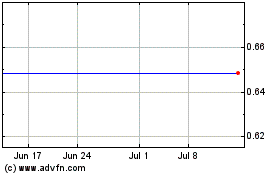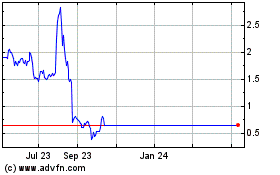Walgreens Deal Spurs Uncertainty -- WSJ
April 03 2017 - 3:02AM
Dow Jones News
By Ezequiel Minaya
Investors awaiting the long-delayed tie-up between drugstore
chains Walgreens Boots Alliance Inc. and Rite Aid Corp. are growing
increasingly uneasy that the deal, heavily scrutinized by
regulators, could fall apart.
Walgreens, Rite Aid and Fred's Inc. -- a Memphis chain that had
agreed to buy 865 stores that were being divested to satisfy the
government -- are set to report earnings this week, potentially
shedding some light on the status of the merger.
Federal regulators are concerned the deal, which would marry the
second- and third-largest pharmacy chains by sales, could stymie
competition. Among the antitrust concerns, the resulting drugstore
giant -- which would challenge CVS Health Corp. -- would be able to
bully pharmacy-benefit managers steering corporate and government
drug plans.
The companies have taken numerous steps to try to appease the
government since they struck a $9.4 billion deal in October of
2015, including agreeing to unload hundreds of stores. Divestitures
are often required in large deals to assuage concerns over market
power and consolidation within specific markets and industries.
In January, the companies said they would cut the amount
Walgreens would pay to between $6.8 billion and $7.4 billion,
depending on how many stores needed to be sold, and added that they
would look to divest even more. The companies set a new deadline of
July 31 to close the deal.
On news of the January announcement, Rite Aid shares dropped
19%, and they have fallen 24% further since then. "The market is
saying [the merger is] not going to go through," said John Ransom,
managing director of St. Petersburg, Fla.-based brokerage firm
Raymond James, which makes markets in shares of both Walgreens and
Rite Aid. Shares of Fred's have declined 7.2% since the
announcement, while Walgreen's shares have risen 1.9%.
"They need to figure out what stores need to go, and what I
heard is that the government wanted the stores to remain open as
retail stores," said Mr. Ransom. "Walgreens initially thought it
was going to be just 500, and it turned out to be much more."
Walgreens and Rite Aid have said they may sell a total of up to
1,200 of Rite Aid's roughly 4,600 stores.
Walgreens said its talks with the government are continuing.
When asked whether Rite Aid had an update on the transaction or
would provide one along with its earnings report, a spokeswoman
referred back to the company's news release from January. The
Federal Trade Commission and Fred's didn't respond to requests for
comment.
The merger's completion is paramount for Rite Aid shareholders,
who have seen the shine fade off their stock after a sharp jump
when the deal was announced. Pending mergers tend to eat up much of
company managers' time, and Rite Aid hasn't spoken to analysts on
an earnings conference call in more than a year with the deal in
limbo.
Walgreens, meanwhile, would be able to significantly expand its
reach with a network of roughly 13,000 drugstores. Rival CVS has
about 7,800 by comparison. Walgreens also could likely reap
considerable savings from the deal.
Fred's owns about 650 stores and had a market capitalization of
roughly $400 million before it agreed to borrow $1.65 billion to
fund the purchase of hundreds of Rite Aid stores. The chain has
posted just about all of its assets, down to its furnishings, to
back the financing.
Write to Ezequiel Minaya at ezequiel.minaya@wsj.com
(END) Dow Jones Newswires
April 03, 2017 02:47 ET (06:47 GMT)
Copyright (c) 2017 Dow Jones & Company, Inc.
Rite Aid (NYSE:RAD)
Historical Stock Chart
From Mar 2024 to Apr 2024

Rite Aid (NYSE:RAD)
Historical Stock Chart
From Apr 2023 to Apr 2024
